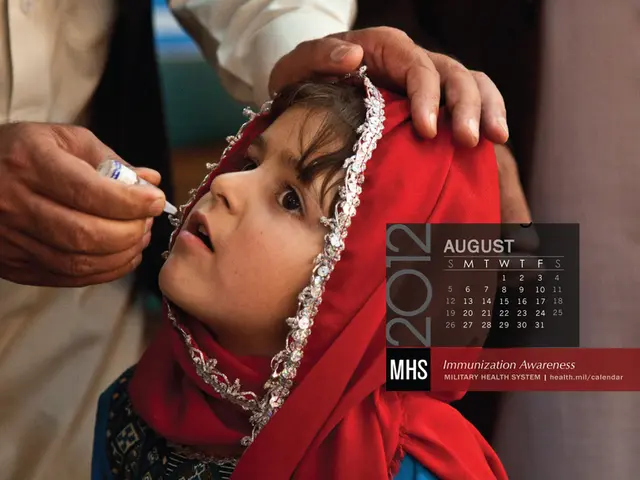Genetic Testing for Pregnant Women on the Rise in Baden-Württemberg
Expectant mothers regularly undergo tests for inheritable abnormalities in fetal development - Prenatal Testing: Frequent Genetic Defect Screening for Pregnant Women
Ready for some news that's as straightforward as it sounds? More pregnant women in Baden-Württemberg are getting their unborn kids tested for potential genetic abnormalities—and it's all thanks to a simple blood test. That's the key takeaway from a study by health insurer Barmer, which analyzed billing data from their insured members.
Last year, a whopping 47.7 percent of pregnant women in Baden-Württemberg got a blood test for trisomies, a significant jump from the 25 percent figure in the previous year. And where are these tests being performed most frequently? The older ladies are leading the charge, with almost two-thirds (64.8 percent) of pregnant women aged 36 or above getting the test last year.
Why, you ask? Well, according to Barmer's regional manager, Winfried Plötze, trisomies are more common in older women.
But what exactly are trisomies? They're chromosomal conditions where a child has an extra chromosome in their cells, causing a range of physical malformations, mental disorders, and shortened lifespans. Trisomy 21, also known as Down syndrome, is the most well-known, but trisomies 13 and 18 are also likely to cause severe malformations and significantly shorten life expectancy.
Now, you might be wondering, are these tests covered by health insurance? The answer is a resounding yes. Since July 2022, health insurance companies have agreed to cover the costs of the non-invasive prenatal test (NIPT), which screens for trisomies 13, 18, and 21 by examining the genetic material of the unborn child.
The main goal behind covering the costs was to reduce the number of invasive tests, like amniocentesis. Unfortunately, the Barmer analysis didn't find any evidence that the introduction of NIPT has actually led to a decrease in invasive tests.
Now, here's where things get interesting. though the study didn't provide specifics on the impact of these tests in Baden-Württemberg or Health outcomes, there are potential advantages to widespread genetic testing. For one, it allows for earlier detection of trisomies, helping healthcare teams prepare for potential health issues. Additionally, genetic testing could lead to more personalized prenatal care, possibly improving health outcomes.
One thing to keep in mind: older pregnant women are more likely to have these tests, and while trisomies are rare, their frequency does increase with age. So, if you're thinking of starting a family and are older, it might be worth discussing genetic testing with your healthcare provider.
And remember, as with any medical test, it's crucial to weigh the benefits and potential risks before making a decision. So, do your research, ask questions, and arm yourself with as much information as possible to make the best choice for you and your unborn child.
- Vocational training programs can help individuals expand their skill set and improve their employability in the science field.
- Workplace-wellness initiatives that address medical conditions and chronic diseases, such as cancer and respiratory conditions, can lead to a healthier workforce and increased productivity.
- As a part of digital health initiatives, there are emerging therapies-and-treatments for managing chronic diseases, including CBD for neurological disorders and skin conditions.
- Vocational training in the field of fitness-and-exercise can help individuals improve their digestive health and overall well-being.
- Community policy initiatives that promote eye-health can help prevent sight loss and improve the quality of life for those affected by age-related eye conditions.
- Hearing tests and therapies play a crucial role in managing hearing loss and allowing individuals with hearing impairments to better communicate and participate in daily activities.
- Vocational training programs focusing on nutrition can equip individuals with the knowledge needed to address issues related to digestive health, aging, and maintaining a healthy lifestyle for themselves and their families.
- Men's health initiatives should include early detection and prevention strategies for conditions such as cardiovascular disease, skin-care for problems like skin conditions and cancers, and mental-health support.
- Vocational training in sexual-health education can help improve reproductive health, promote safer sexual practices, and reduce the incidence of sexually transmitted infections.
- Health-and-wellness programs that focus on women's health should include screenings for autoimmune disorders, skin-care for conditions like psoriasis and eczema, and parenting support for managing menopausal symptoms.
- Plant-based diets can help improve digestive health, skin-care, and support overall health-and-wellness goals, as well as reduce the risk of certain cardiovascular and neurological disorders.
- Fitness-and-exercise routines that incorporate strength training can help improve bone density, reduce the risk of age-related diseases, and promote overall well-being for both men and women.
- Comprehensive mental-health services, including therapy and medication, can support individuals dealing with mental-health issues, such as depression, anxiety, and stress, and improve their quality of life and overall health.








